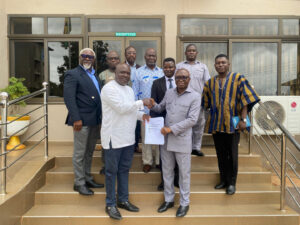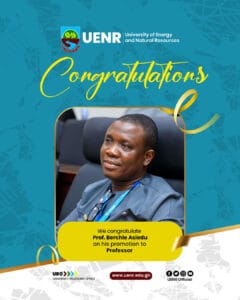
The Dean of School of Energy, Prof. Samuel Gyamfi has cautioned that if the world continues to burn the remaining coal, oil and gas underneath, the global CO2 emissions would increase, thus causing temperature rise to 8ºC. According to him, if an immediate intervention is not taken to reduce carbon emission, the world would have less chances of stabilizing temperatures to 2 ºC. Hence life on earth would be unbearable as temperatures and sea level rises causing flooding and wildfires.
Speaking further on Energy Transition (Ghana achieving 10% RE by 2030) during a Renewable Energy Campaign for Tertiary Institutions which was organized by G-ROC on Monday, September 5, 2022 in collaboration with the School of Energy, Prof. Gyamfi said there are less options to save this situation than a transition from current energy systems to largely based renewable energy systems. He also recommended that using clean energy such as nuclear energy, reducing population growth and decoupling economic growth from energy use are the other options to limit the global average temperature to below 2 ºC noting that “the probability of getting 1.5 ºC is about 67% which would demand a lot of effort to be achieved”.

A Renewable Energy Activist and the National Coordinator for 350 Ghana Reducing Our Carbon (G-ROC), Ms. Portia Adu Mensah in her presentation, urged the students them to step up efforts in contributing to Government of Ghana (GoG) target to achieve 10% penetration of the variable renewable energy by 2030. She said renewable energy is the future of the globe hence young people should join in changing the narrative that fossil energy is not the answer to climate change issues but clean energies such as renewable energy. Ms. Adu Mensah added that students with the expertise should not relax in writing articles, proposals on renewable energy and green jobs ideas, which can attract the attention of key players on the climate change negotiation table. She said “we can stay in our rooms and campaign for the good course”.

The Campaign on the theme “Social Innovation in The Energy Transition: People-Centered Participation Models” aimed at raising young people to be renewable energy Champions by writing articles and adding their voices to the debate on the effect of climate change and gathered participants from the School of Energy, School of Engineering as well as other tertiary institutions across Ghana.
Other presentations included Social Innovation in the Energy Transition: People Centred Participants Models, delivered by Dr. Gifty Serwaa Mensah, a Research Fellow at the Regional Centre of Energy and Environmental Sustainability (RCEES).







